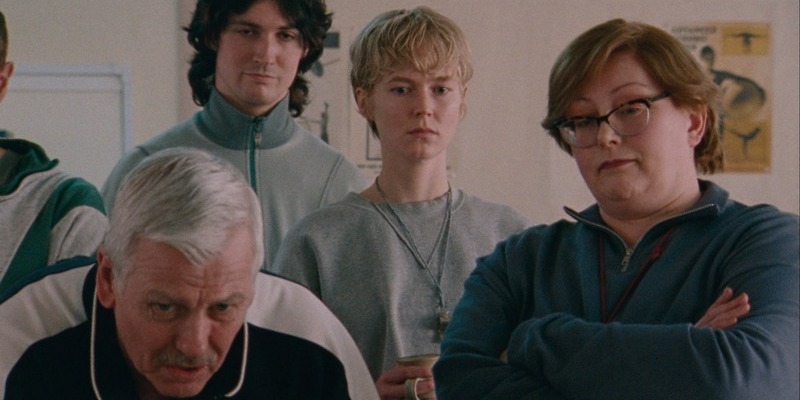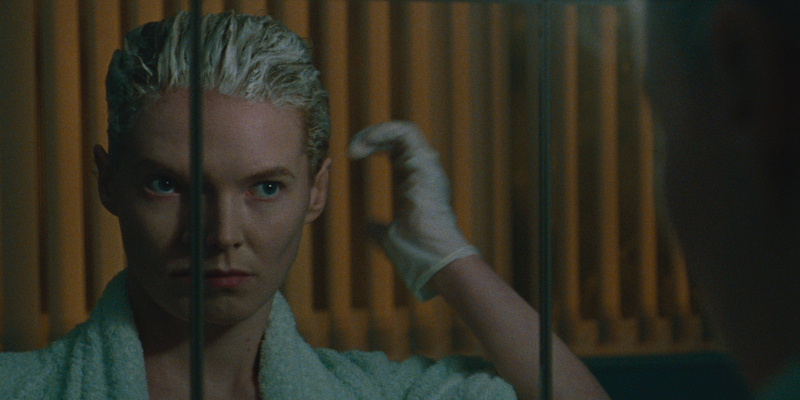
Review by
Benjamin Poole
Directed by: Georgia Oakley
Starring: Rosy McEwen, Lydia Page, Lucy Halliday, Kerrie
Hayes, Stacy Abalogun

Twitter comments on a video featuring a non-binary popstar getting up to
the sort of hijinks which have been an integral aspect of pop music
iconography since Elvis swung his hips: "vile and evil," "a freak...
fucking weirdo," "it's disgusting." Headlines concerning LGBTQ+ presence
in schools: "[it] risks safety," "blame 'woke' culture for influencing
impressionable teens," "dozens of teachers on the front line of a
culture war voicing their concerns over children changing gender." Not
archival rhetoric from the dark ages; the above missives were published
over the last year, some this very week. The video is that Sam Smith
one, and you can guess which paper the headlines were from (I certainly
won't be linking them). Dunno about you, but I've noticed a steady
re-emergence of this sort of thing; angry heteronormative voices,
clutching pearls in one hand while shaking a fist with the other. I’m
unsure if this unpleasantry is distinctly against the gays or the trans
(the dissenters lump them together, after all), or if it's just another
facet of the modern way of hating everything and everyone, including
oneself, and looking for something to pin it on (one tweet vis-à-vis Sam
Smith came from renowned fan of pop music and the most opportunist of
all would-be provocateurs Jordan "B" Peterson, putting his hips out
leaping on the band wagon and thus necessitating more lovely opioids:
sit back down, grandad). Won't anyone think of the children?!

Mind you, in the nineties it was even worse. Due to Section 28
1988-2003, the "promotion of homosexuality" was outlawed in classrooms.
In rabid homophobic hysteria, "promotion" essentially translated to even
mentioning being gay, the gays, Kylie Minogue, etc. Gayness was
verboten. As well as reinforcing stigmatisation of the LGBTQ+ community,
Section 28 forced ordinary and everyday people to live a lie, and
emergent gay kids to possibly deny who they were and self-loath. It was
a fucking disgrace. And the straights wonder why Pride is such a big
deal. Let's not forget what happens when blind bigotry and
heart-breaking stupidity is exploited by sensationalist media and
self-serving agendas, yeah? Georgia Oakley (who was born the year
Section 28 was founded) certainly hasn't. Her debut cinema feature
centres on a lesbian PE teacher in a small town with small minds at the
end of the eighties. In work Jean (Rosy McEwen), coded as gay
from the off with her amazing hair and pet cat, distances herself from
colleagues and is subject to sneery comments from her students (that's
the thing about laws against homosexuality: they legitimise hatred).
It's not all bad, though, as outside of school Jean has a partner and a
solid group of mates, who meet, almost nightly it seems, in a local gay
bar (perhaps a minor consolation of the absolute nonsense gays in the
past went through was the bonding, familial sensation of being in a
gang). Thus, Jean manages to keep things on a fairly even keel... until
one of her students reaches out for support in the clumsy way that kids
do, especially when their coming to terms with who they are is being
suffocated by meaninglessly cruel social and political contexts.
Blue Jean engenders an atmosphere of fraught, wearied
paranoia. As Jean stoically continues in her job, the film drops in real
life news footage of politicos discussing the impending legislation, and
the "right to be gay." You wonder, as always with homophobia, what
people were/are scared of. Even putting aside it "mattering," as if a
teacher could influence a kid's sexuality (I have tangential experience
of the sector, and believe me, it's enough of a challenge to get kids to
pick up a pen, let alone alter their entire being). Still, mid-teen
pupil Lois (Lucy Halliday) attempts to get close to Jean. She
turns up at the gay bar and expects Jean's support when she kicks
against the bullying pricks in the classroom, yet the teacher keeps a
distance. As all kids should be, Lois is idealistic and angry, but also
naturally injudicious: as, after all, for Jean, with a home and a cat,
her entire livelihood is on the line.

Oakley films with a conspicuously female gaze, where lesbian sex is
celebrated, and female flesh is illicitly charged. There are a couple of
group shower scenes in Blue Jean that would make Brian
DePalma drop his walking stick, although here the depiction of nudity is
not voyeuristic, but pertains to danger, emphasising the outsider
perception that for Jean the nakedness of her charges may not be
neutrally received (we see the same tedious argument now, but this time
concerning trans people and changing rooms, etczzz). Further to the
immersive positioning, Blue Jean often has a feeling of
repression, of disinclination: that mid-week sensation of the weekend's
fun fading, and the next one still days away. We all live for the
weekend but imagine if Saturday night was the only point in the week you
could be yourself. The in-between times would drag.
But as Lois' behaviour intensifies perhaps Jean longs for less
interesting days... What is refreshing and vital about Oakley's
representations is the absence of Holy Gays. Jean, conflicted and
arguably unsupportive towards Lois, is flawed. Her GF Viv (Kerrie Hayes) is a bit of a pain, too - a butch lesbian styled and seemingly
coached by Millie Tant, she browbeats Jean about responsibility to the
cause, and her fundamental ignorance of Jean's position is underlined
when she rings her work landline for a chat (you just don't, do you?).
Jean's life is further contextualised by that of her sister's bland
heterosexual existence of nightmare kid and magnolia painted suburban
walls. Is there a sense of playing to the gallery with the abject
presentation of Lisa's conformity: the awkward small talk at the kid's
birthday party, the inherent alienation of such situations which
desperately contrast the furtive bonhomie of the gay bar, the rigid
roles certain straight people are doomed to enact? Bless 'em. No wonder
some of them are so furious all the time.

In a pleasing synchronicity with this quarter's other big LGBTQ+
release,
M3GAN, in one scene our heroine reads Alice's Adventures in Wonderland to a
child. The implication is clear: Jean is in a surreal world where the
rules are often unfairly mercurial, and it's up to her to negotiate its
potential traps and pitfalls. Except, for Alice the experience was as a
dream, while Jean lives a nightmare. It's one you'd hope we would have
woken up from after all these years, alas the pernicious narratives of
recent times make the suggestions of Blue Jean as pressing
as they ever were.

Blue Jean is on UK/ROI VOD now.
